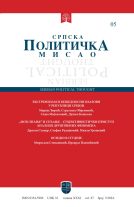- Home page
- Researchers
- Vladimir Djurić
Vladimir Djurić
Institute of Comparative Law, Belgrade

THE JUSTIFICATIONS AND THE LIMITS OF THE MINORITY NON-TERRITORIAL ARRANGEMENTS IN LIBERAL DEMOCRARCY
In this paper the author analyses the justifications and the limits of minority non-territorial autonomy arrangements in liberal democracy. Non-territorial autonomy can be defined as a self-rule of a group of persons through a sub-state entity with a non-territorial character, in matters considered vital for the maintenance and reproduction of their culturally distinctive features which could be their language, culture, religions or customs. The concept of non-territorial autonomy is essentially linked with national minorities and with institutional arrangements for their representation and for the exercise of such autonomy. This concept, named as segmental autonomy, along with grand coalition, mutual veto and proportionality, is considered to be one of the constitutive elements of the consociational democracy model. The justification for the adoption of the minority non-territorial autonomy concept within liberal democracy model could be found in the necessity of the collective rights’ acknowledgement and the representation of national minorities as their subjects, theoretically based on Kymlicka’s works. On the other hand, it seems to be some inherent limits for the creation of the non-territorial minority arrangements in the liberal democracy model. First of all, there is a problem linked with the democratic legitimacy of such arrangements. Many authors are of the opinion that the democratic legitimacy of the non-territorial minority bodies can only be achieved through free elections in which the voters are persons belonging to national minorities and which are enrolled in the separate voter’s register. That solution creates huge and probably unsolvable problem of competences for the solution of disputes in case of a conflict between two constitutional values: democratic legitimacy if it is based on described election model and the freedom of ethnic affiliation, namely a conflict between individual self-identification and the objective, eventually legally defined, criteria for the estimation of one persons’ origin wich can, in last instance, involve the state authorities. But that kind of problem isn’t the only argument for the thesis of the existence of the inherent limits for the creation of the non-territorial minority arrangements in the liberal democracy model. To be specific: if the acknowledgement of the collective rights and the necessity of the fondation of the non-territorial autonomy arrangements are the acceptable and required correction of the classical liberal democracy model, than we can claim that minority cultural and educational associations should take part in the establishment of the minority non-territorial arrangements, especially because they are emanation of the previously expressed collectivity and of the sense of solidarity which are subjective elements in the concept of a minority. Moreover, minority non-territorial arrangements are not political representations and their legitimisation can’t be founded on the classical liberal legitimacy formula. That lead us to the second type of the inherent limitations for the non-territorial minority arrangements in the liberal democracy model. In liberal democracy the normative functions are vested in the political representations. Because of that, the regulatory functions are exceptional among the public powers of those arrangements. Moreover, the veto power can’t be a part of the those arrangements’ public powers because it would mean the recomposition of the liberal democracy model and turn to the consociational democracy model.
